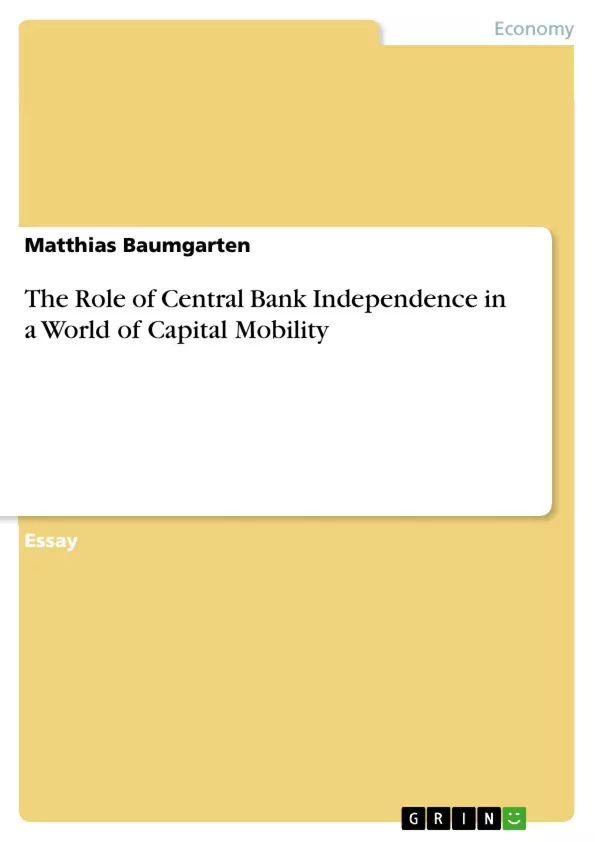Historical developments during recent economic history have demonstrated a remarkably parallel development of international capital mobility (ICM) and central bank independence (CBI), making both fundamental factors of today’s monetary system. Neoliberal economic models depict the anti-inflationary credibility associated with CBI as the outcome of strict market rules, insulating policy from political control. The structural power of mobile capital subsequently forced governments to adopt it as policy. However, the theoretical assumptions underlying these arguments misrepresent current realities and obscure the fact that credibility is a social phenomenon. Looking at CBI as a social institution shows that it facilitates a consensus between current political and market interests. For financial market actors, CBI functions as a guide for their intersubjective expectations and ensures the continuity of the current economic order with the financial markets at its centre. Governments consciously support the embedding of society within these markets, while shielding themselves from the reputational costs of adverse market outcomes. Within this consensus, substantial indirect state control over policy decisions remains. Consequently, CBI’s central importance does not lie in anti-inflationary credibility derived from the removal of political control, but in its institutional role as a link between political and market interests in contemporary financial governance.
Inhaltsverzeichnis (Table of Contents)
- Abstract
- Introduction
- Historic developments
- Theories of central bank independence
- Central bank independence as a social institution
- Conclusion
Zielsetzung und Themenschwerpunkte (Objectives and Key Themes)
This essay explores the relationship between international capital mobility (ICM) and central bank independence (CBI) in the modern monetary system. The main objective is to challenge the conventional understanding of CBI as a tool for achieving anti-inflationary credibility through the removal of political control. The essay argues that CBI, instead, facilitates a consensus between political and market interests, enabling a state-market partnership in contemporary financial governance.
- The historical development of ICM and CBI
- The impact of mobile capital on monetary policy
- The role of CBI in shaping market expectations
- The social and institutional foundations of CBI
- The interplay between state and market interests in the context of CBI
Zusammenfassung der Kapitel (Chapter Summaries)
- Abstract: The abstract presents the key argument of the essay, challenging the traditional view of CBI as solely driven by anti-inflationary credibility and highlighting its role in facilitating a state-market consensus in financial governance.
- Introduction: The introduction establishes the context by discussing the significance of ICM and CBI in the contemporary monetary system. It highlights the increasing correlation between these phenomena throughout recent economic history, particularly after the Bretton Woods era.
- Historic developments: This section traces the historical development of both ICM and CBI through three distinct phases: the gold standard era, the Bretton Woods era, and the current era of highly mobile capital and increasingly independent central banks. It emphasizes the interplay between technological advancements, financial innovation, and the shifting political and economic landscape in shaping these trends.
- Theories of central bank independence: This section examines existing economic theories that explain the relationship between ICM and CBI. It explores two main perspectives: the view of CBI as a mechanism for removing political influence and ensuring anti-inflationary credibility, and the ‘capital mobility hypothesis,’ which attributes the adoption of CBI to the structural power of mobile capital.
Schlüsselwörter (Keywords)
The essay focuses on the key concepts of international capital mobility (ICM), central bank independence (CBI), anti-inflationary credibility, state-market consensus, and financial governance. It examines the impact of mobile capital on monetary policy, the role of CBI in shaping market expectations, and the underlying social and institutional foundations of CBI.
Frequently Asked Questions
What is the relationship between Capital Mobility and Central Bank Independence (CBI)?
The essay argues that international capital mobility (ICM) and CBI have developed in parallel. Highly mobile capital puts structural pressure on governments to adopt independent central banks to maintain economic credibility in global markets.
Is Central Bank Independence purely a tool for anti-inflationary credibility?
No, the essay challenges this view. It suggests that CBI's main importance lies in its role as a social institution that facilitates a consensus between political interests and financial market expectations.
How do financial markets view an independent central bank?
For market actors, CBI serves as a guide for intersubjective expectations. it ensures the continuity of the economic order and protects financial interests from direct political interference.
Does CBI remove all political control over monetary policy?
The essay argues that while CBI appears to remove political control, substantial indirect state control remains. Governments use CBI to shield themselves from the reputational costs of negative market outcomes.
How has the role of central banks evolved since the Bretton Woods era?
Since the end of Bretton Woods, central banks have moved towards greater independence as capital became more mobile, shifting the focus from state-led policy to a partnership between state and market interests.
- Citation du texte
- Matthias Baumgarten (Auteur), 2011, The Role of Central Bank Independence in a World of Capital Mobility, Munich, GRIN Verlag, https://www.grin.com/document/187940



